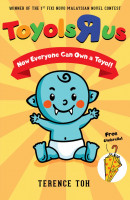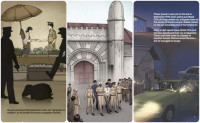YOU don’t need to have read any of British author David Mitchell’s previous eight novels to enjoy his latest: 'Utopia Avenue'.
I haven’t and I did, though I have watched the movie of his book ‘Cloud Atlas’, starring Tom Hanks, if that counts, which probably it doesn’t, or shouldn’t. But for those already familiar with the body of Mitchell’s work, there are many winks and nods and references to his other books. Call them Easter Eggs, if you must.
While this device allows the writer to place ‘Utopia Avenue’ within the larger framework of his oeuvre, this book takes it a step further, being replete with cultural references, mostly musical, that may or may not pass by a reader unfamiliar with the psychedelic audioscape of the late 1960s Anglosphere, positioning this book in a very real historical context.
It is 1967 and Dean, Elf, Jasper, and Griff are in a band, blending their proclivities towards folk, rock, dexterous guitar noodling, and jazz drumming to create a unique eclectic style that sees their first album reach the charts, further bolstered by an appearance on ‘Top of the Pops’, hosted by an unsettling Jimmy Saville.
Saville is just one of the many real-life characters to play walk-on cameos in this book, though in fairness most are more savoury than unsavoury and more sympathetically portrayed.
An exhaustive list of the personalities included would probably exceed the allotted wordcount of this book review, but to give a small idea, there are scenes that include the likes of David Bowie, Joni Mitchell, John Lennon, Syd Barrett, Leonard Cohen, Francis Bacon, Brian Jones, Janis Joplin, Jerry Garcia, and Frank Zappa. Most of these are given actual lines, as are many more, but if those name-dropped were to be added the extended cast might well number in the hundreds.
The novel takes place over two years and is structured in a way that echoes the band’s three albums, each making one of the traditional three acts, though since this is vinyl there are A and B sides (ask your grandparents, or Google).
Each album side is further broken down into individual tracks, which conveniently form the chapters and share their titles.
Of the four main characters, Griff, the Yorkshire drummer, gets the least amount of limelight, ever the fate of drummers the world over. He is simply there in the background most of the time, because every band needs a drummer, though a reader might be forgiven for feeling that if Mitchell could have plausibly left him out, he might have done so without regret.
Working-class Dean is from the ominously-named Gravesend. He plays bass and is endowed with the good looks that bring young women flocking to backstage doors, and from there into his bed.
Elf, whose real name is Elizabeth, is an upper-middle class, classically-trained pianist, though her instruments of predilection are the folk guitar and the Hammond organ. A woman in a man’s world, she is quick-witted and gives as good as she gets, subduing hecklers and winning the admiration of young women, very few of whom flock to backstage doors, and even fewer yet who make it as far as her bed.
Jasper de Zoet is perhaps the most intriguing character of all. Just knowing that one of Mitchell’s previous novels, set in 18th century Japan, is titled ‘The Thousand Autumns of Jacob de Zoet’, immediately hints at an extensive ancestral backstory. To reveal the link would be a spoiler, but the alerted reader expecting some crossover will not be left unserved.
Jasper is ‘Utopia Avenue’s’ lead guitarist and a very troubled young man. Among his various afflictions are an inability to read people’s emotions, which hints at Asperger’s Syndrome, though that is never openly stated. But more intrusively, he is apparently possessed by a malevolent entity that manifests itself through auditory hallucinations of a repeated knocking sound, which gives this being the moniker of ‘Knock-Knock’, though later we learn more about its true nature.
The fifth wheel to this foursome is the band’s Canadian manager, Levon Frankland, a character who appears elsewhere in Mitchell’s body of work. Levon is responsible for initially bringing the band together, handpicking its members through means fair and foul. Though he is not averse to delving into what he refers to as ‘the dark arts’ of show business management, he is honest and has the band’s best interests at heart. Being Jewish and homosexual, it is hard not to equate him with The Beatles’ erstwhile manager, Brian Epstein, though Levon seems more savvy than the latter.
Indeed, there are plenty of echoes of the history of The Beatles, and dozens of other bands, throughout this novel. Anyone familiar with the background of the music of this time will smile or nod in recognition at many of the scenes and anecdotes.
The different class backgrounds of the characters allow Mitchell greater scope to indulge in social commentary. But he also shows that regardless of differing means, everybody faces difficulties.
Completing the ternary of rock and roll are the inevitable sex and drugs. Most of the sex goes on closeted behind closed doors, but the drugs are rolled up and smoked, chopped into snorted lines, intravenously injected, popped as pills, and placed on tongues in dissolving tabs of impregnated rice paper. But the book doesn’t glamourise drug-taking. Rather it treats it as a matter-of-fact facet of the swinging sixties scene in London’s Soho, and later in hedonistic settings in California’s two best-known cities.
As a literary device, drugs give Mitchell permission to indulge in descriptions of altered levels of experience, though he also mines this vein through more esoteric means that overlap with his novel ‘The Bone Clocks’.
Each of the band members alternates as being the main character throughout the novel, each living through their share of challenges, all, or at least most of which they channel back into their music, the songs’ lyrics often being a cathartic way to resolve their inner conflicts, or if not resolve, at least give them expression.
As novels go, this is a long one. Any book that occupies hours and hours of a reader’s life makes the lives of the characters become more plausible simply by their persistent duration. But there is more than length of exposure to 'Utopia Avenue’s' band members at work here. Mitchell is an empathetic and masterful storyteller, yet for a writer who has a (perhaps-undeserved?) reputation for being complicated, the writing here is very accessible and enjoyable in its easy flow.
Late in the book a character quotes jazz double-bassist and band-leader Charles Mingus as saying: ‘Writing about music is like dancing about architecture.’ It’s an often-used phrase, attributed to many different people, but no less valid for that. By deploying it, Mitchell acknowledges the near-impossibility of reproducing music in words. Despite this, he makes several valiant attempts, convincingly capturing many moments of the music-making process, from a random line recycled into lyrics, or a chord progression that seems to write itself, to the audience reaction, to a dazzling guitar solo, or even to fans singing along to lyrics they know better than the band members, and more.
Being deeply familiar with the music and musicians featured in this book, I might be in a way Mitchell’s ideal reader. Furthermore, I have had the privilege of spending time in many of the major locations featured in the book (though I have yet to find myself incarcerated in an Italian jail).
I am also practically the same age as Mitchell. I say all this to explain that I may not have the same degree of objectivity that a reader unfamiliar, or less familiar, with the subject matter might have when it comes to this book. But with that disclaimer out of the way, I will enthuse and categorically say that ‘Utopia Avenue’ is in the top-five favourites of the novels I have read in 2020. – The Vibes, December 26, 2020

Title: Utopia Avenue
Author: David Mitchell
Publisher: Sceptre
ISBN: 9780593215104
Pages: 576



.jpg)


















